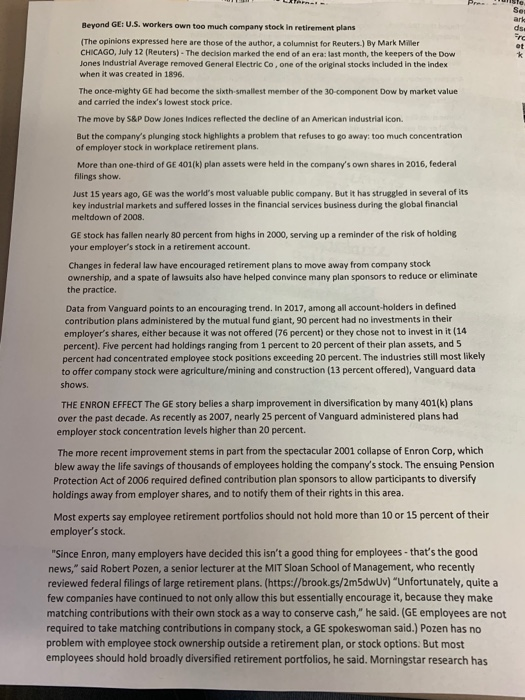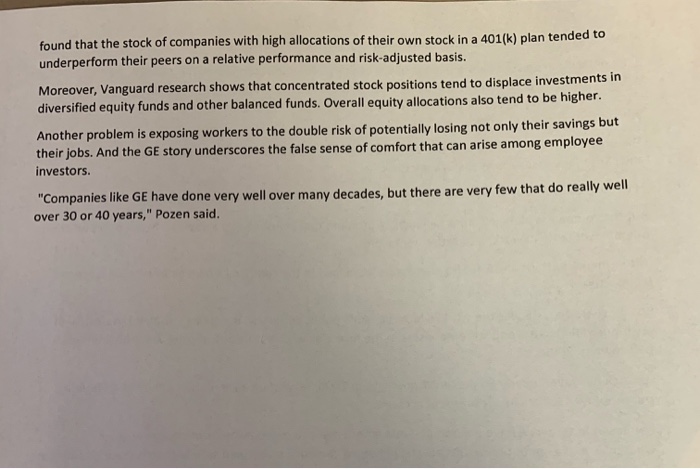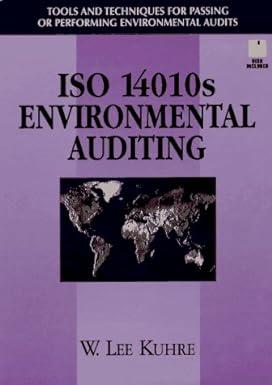Answered step by step
Verified Expert Solution
Question
1 Approved Answer
1. What is the concern highlighted in the article and what step(s) should be takeb to overcome it? 2. How might you to determine how
1. What is the concern highlighted in the article and what step(s) should be takeb to overcome it? 

Ser ark dse tro et k Beyond GE U.S. workers own too much company stock in retirement plans (The opinions expressed here are those of the author, a columnist for Reuters.) By Mark Miller CHICAGO, July 12 (Reuters) - The decision marked the end of an era: last month, the keepers of the Dow Jones Industrial Average removed General Electric Co, one of the original stocks included in the index when it was created in 1896. The once-mighty GE had become the sixth-smallest member of the 30-component Dow by market value and carried the index's lowest stock price. The move by S&P Dow Jones Indices reflected the decline of an American industrial icon. But the company's plunging stock highlights a problem that refuses to go away: too much concentration of employer stock in workplace retirement plans. More than one-third of GE 401(k) plan assets were held in the company's own shares in 2016, federal filings show Just 15 years ago, GE was the world's most valuable public company. But it has struggled in several of its key industrial markets and suffered losses in the financial services business during the global financial meltdown of 2008. GE stock has fallen nearly 80 percent from highs in 2000, serving up a reminder of the risk of holding your employer's stock in a retirement account. Changes in federal law have encouraged retirement plans to move away from company stock ownership, and a spate of lawsuits also have helped convince many plan sponsors to reduce or eliminate the practice. Data from Vanguard points to an encouraging trend. In 2017, among all account holders in defined contribution plans administered by the mutual fund giant, 90 percent had no investments in their employer's shares, either because it was not offered (76 percent) or they chose not to invest in it (14 percent). Five percent had holdings ranging from 1 percent to 20 percent of their plan assets, and 5 percent had concentrated employee stock positions exceeding 20 percent. The industries still most likely to offer company stock were agriculture/mining and construction (13 percent offered), Vanguard data shows. THE ENRON EFFECT The GE story belies a sharp improvement in diversification by many 401(k) plans over the past decade. As recently as 2007, nearly 25 percent of Vanguard administered plans had employer stock concentration levels higher than 20 percent. The more recent improvement stems in part from the spectacular 2001 collapse of Enron Corp, which blew away the life savings of thousands of employees holding the company's stock. The ensuing Pension Protection Act of 2006 required defined contribution plan sponsors to allow participants to diversify holdings away from employer shares, and to notify them of their rights in this area. Most experts say employee retirement portfolios should not hold more than 10 or 15 percent of their employer's stock. "Since Enron, many employers have decided this isn't a good thing for employees - that's the good news," said Robert Pozen, a senior lecturer at the MIT Sloan School of Management, who recently reviewed federal filings of large retirement plans. (https://brook.gs/2m5dwUv) "Unfortunately, quite a few companies have continued to not only allow this but essentially encourage it, because they make matching contributions with their own stock as a way to conserve cash," he said. (GE employees are not required to take matching contributions in company stock, a GE spokeswoman said.) Pozen has no problem with employee stock ownership outside a retirement plan, or stock options. But most employees should hold broadly diversified retirement portfolios, he said. Morningstar research has found that the stock of companies with high allocations of their own stock in a 401(k) plan tended to underperform their peers on a relative performance and risk-adjusted basis. Moreover, Vanguard research shows that concentrated stock positions tend to displace investments in diversified equity funds and other balanced funds. Overall equity allocations also tend to be higher. Another problem is exposing workers to the double risk of potentially losing not only their savings but their jobs. And the GE story underscores the false sense of comfort that can arise among employee investors. "Companies like GE have done very well over many decades, but there are very few that do really well over 30 or 40 years," Pozen said. Ser ark dse tro et k Beyond GE U.S. workers own too much company stock in retirement plans (The opinions expressed here are those of the author, a columnist for Reuters.) By Mark Miller CHICAGO, July 12 (Reuters) - The decision marked the end of an era: last month, the keepers of the Dow Jones Industrial Average removed General Electric Co, one of the original stocks included in the index when it was created in 1896. The once-mighty GE had become the sixth-smallest member of the 30-component Dow by market value and carried the index's lowest stock price. The move by S&P Dow Jones Indices reflected the decline of an American industrial icon. But the company's plunging stock highlights a problem that refuses to go away: too much concentration of employer stock in workplace retirement plans. More than one-third of GE 401(k) plan assets were held in the company's own shares in 2016, federal filings show Just 15 years ago, GE was the world's most valuable public company. But it has struggled in several of its key industrial markets and suffered losses in the financial services business during the global financial meltdown of 2008. GE stock has fallen nearly 80 percent from highs in 2000, serving up a reminder of the risk of holding your employer's stock in a retirement account. Changes in federal law have encouraged retirement plans to move away from company stock ownership, and a spate of lawsuits also have helped convince many plan sponsors to reduce or eliminate the practice. Data from Vanguard points to an encouraging trend. In 2017, among all account holders in defined contribution plans administered by the mutual fund giant, 90 percent had no investments in their employer's shares, either because it was not offered (76 percent) or they chose not to invest in it (14 percent). Five percent had holdings ranging from 1 percent to 20 percent of their plan assets, and 5 percent had concentrated employee stock positions exceeding 20 percent. The industries still most likely to offer company stock were agriculture/mining and construction (13 percent offered), Vanguard data shows. THE ENRON EFFECT The GE story belies a sharp improvement in diversification by many 401(k) plans over the past decade. As recently as 2007, nearly 25 percent of Vanguard administered plans had employer stock concentration levels higher than 20 percent. The more recent improvement stems in part from the spectacular 2001 collapse of Enron Corp, which blew away the life savings of thousands of employees holding the company's stock. The ensuing Pension Protection Act of 2006 required defined contribution plan sponsors to allow participants to diversify holdings away from employer shares, and to notify them of their rights in this area. Most experts say employee retirement portfolios should not hold more than 10 or 15 percent of their employer's stock. "Since Enron, many employers have decided this isn't a good thing for employees - that's the good news," said Robert Pozen, a senior lecturer at the MIT Sloan School of Management, who recently reviewed federal filings of large retirement plans. (https://brook.gs/2m5dwUv) "Unfortunately, quite a few companies have continued to not only allow this but essentially encourage it, because they make matching contributions with their own stock as a way to conserve cash," he said. (GE employees are not required to take matching contributions in company stock, a GE spokeswoman said.) Pozen has no problem with employee stock ownership outside a retirement plan, or stock options. But most employees should hold broadly diversified retirement portfolios, he said. Morningstar research has found that the stock of companies with high allocations of their own stock in a 401(k) plan tended to underperform their peers on a relative performance and risk-adjusted basis. Moreover, Vanguard research shows that concentrated stock positions tend to displace investments in diversified equity funds and other balanced funds. Overall equity allocations also tend to be higher. Another problem is exposing workers to the double risk of potentially losing not only their savings but their jobs. And the GE story underscores the false sense of comfort that can arise among employee investors. "Companies like GE have done very well over many decades, but there are very few that do really well over 30 or 40 years," Pozen said 2. How might you to determine how diversified your investment/savings portfolio is?


Step by Step Solution
There are 3 Steps involved in it
Step: 1

Get Instant Access to Expert-Tailored Solutions
See step-by-step solutions with expert insights and AI powered tools for academic success
Step: 2

Step: 3

Ace Your Homework with AI
Get the answers you need in no time with our AI-driven, step-by-step assistance
Get Started


